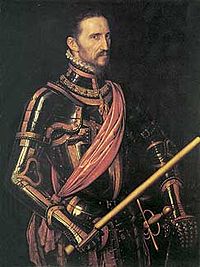Fernando Álvarez de Toledo 3rd Duke of Alba
Politician
Fernando Álvarez de Toledo y Pimentel (Piedrahita, 29 October 1507 – Lisbon, 11 December 1582), known as the Grand Duke of Alba in Spain and the Iron Duke in the Netherlands, was a Spanish noble, general, and diplomat. He was titled the 3rd Duke of Alba de Tormes, 4th Marquis of Coria, 3rd Count of Salvatierra de Tormes, 2nd Count of Piedrahita, 8th Lord of Valdecorneja, Grandee of Spain, and a Knight of the Order of the Golden Fleece. His motto in Latin was Deo patrum Nostrorum, which in English means "To the God of our fathers".He was an adviser of King Charles I of Spain (Charles V, Holy Roman Emperor), and his successor, Philip II of Spain, Mayordomo mayor of both, member of their Councils of State and War, governor of the Duchy of Milan (1555–1556), viceroy of the Kingdom of Naples (1556–1558), governor of the Netherlands (1567–1573) and viceroy and constable of the Kingdom of Portugal (1580–1582). He represented Philip II in negotiating Philip's betrothal to Elisabeth of Valois and Anna of Austria, who were the third and fourth - and last wives of the king.He is considered the best general of his generation by some historians and one of the best generals ever. Although a tough leader, he was respected by his troops. The speeches where he referred to "gentlemen soldiers" were liked by his troops. Alba especially distinguished himself in the conquest of Tunis (1535) during the Ottoman-Habsburg wars when Carlos I defeated Hayreddin Barbarossa and returned the Spanish Monarchy to predominance over the western Mediterranean Sea. He also distinguished himself in the battle of Mühlberg (1547), where the army of Emperor Charles defeated the German Protestant princes.He is best known for his actions against the revolt of the Netherlands, where he instituted the Council of Troubles, and repeatedly defeated the troops of William of Orange and Louis of Nassau in the battle of Jemmingen (1568) during the first stages of the Eighty Years' War. He is also known for the brutalities during the capture of Mechelen, Zutphen, Naarden and Haarlem. In spite of these military successes, the Dutch revolt was not broken and Alba was recalled to Spain. His last military successes were in the Portuguese succession crisis of 1580, winning the Battle of Alcantara and conquering that kingdom for Philip II. Spain unified all the kingdoms of the Iberian Peninsula and consequently expanded its overseas territories.
Personal facts
| Alias (AKA) | Grand Duke of Alba |
|---|
| Birth date | October 29, 1507 |
|---|
| Birth place | Spain , Ávila Spain , Province of Ávila , Piedrahíta |
|---|
| Religion | |
|---|
| Date of death | December 11, 1582 |
|---|
| Place of death | Lisbon , Portugal , Kingdom of Portugal |
|---|
| Children | Fadrique Álvarez de Toledo 4th Duke of Alba |
|---|
